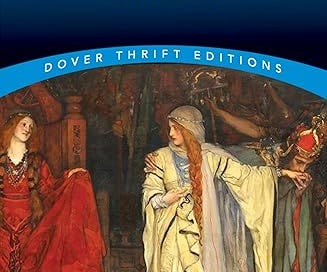If you are looking for the beginning of the study for Shakespeare’s “King Lear” then you can go HERE for a brief introduction. At the bottom of the introduction you will find the links to each section of the study guide as it becomes available. If you would like to see the growing list of book studies available for free on this site you can go HERE. Enjoy!
Virtues/Vices/Great Ideas: (Find them in the Text)
Deception, Hypocrisy, License, Despotism, Despair, Repentance
Grammar Questions: (The Information of the Text)
About what did Edgar deceive his father?
What did Edgar claim about the (supposed) other person who had been with the Earl of Gloucester?
Who showed up in the midst of Edgar’s and the Earl of Gloucester’s conversation and what was his behavior like?
What did King Lear tell the Earl of Gloucester a man may do without eyes? How may he do this?
What did the Gentleman and the attendants come to do?
Who showed up after the Gentleman moved on, what did he attempt to do, and what became of him?
What did Edgar learn from the letter he finds amongst the man’s personal items?
How did Cordelia treat Kent when she spoke with him?
How did King Lear behave once Cordelia woke him?
Where did King Lear wonder if he was?
Logic Questions: (Interpreting, Comparing/Contrasting, Reasoning)
Why did Edgar perform such an elaborate ruse (trick) on his father and make him believe he had fallen from the cliff?
Why was King Lear talking about “press money” and “crow-keepers” and “gauntlets” and “brown bills,” etc.? What was Shakespeare trying to communicate about Lear in that moment?
What did King Lear mean when he said, “They flattered me like a dog, and told me I had white hairs in my beard ere the black ones were there?”
Why might the Earl of Gloucester have wished to kiss the king’s hand in light of, or perhaps in spite of, his rant?
King Lear told the Earl of Gloucester, “Plate sin with gold, and the strong lance of justice hurtless breaks; arm it in rags, a pigmy’s straw does pierce it.” What did he mean by that?
When Edgar said “O, matter and impertinency mix’d! Reason in madness!” what did he mean?
What did King Lear mean when he said, “I am the natural fool of fortune?”
The Gentleman said to King Lear, “Thou hast one daughter, who redeems nature from the general curse which twain have brought her to.” What did he mean by that?
Why did Edgar suddenly adopt a German accent when Oswald showed up?
How might Edgar make use of the information he found in the letter Oswald was carrying?
Why did Cordelia urge Kent to “be better suited?”
Why did King Lear tell Cordelia, “I pray, weep not: If you have poison for me, I will drink it?”
What did Kent mean when he said, “report is changeable?”
What did Kent mean when he said, “My point and period will be thoroughly wrought, or well or ill, as this day’s battle’s fought?”
Rhetoric Questions: (The Analysis of Ideas in the Text)
Consider the part of the story where Cordelia goes to wake King Lear. What other stories can you think of which have a similar scenario or situation? Let’s make much of this, how is this like and unlike other stories where one person goes to wake another? If we were to allegorize this part of the text (read it symbolically), what might we argue that Cordelia symbolizes and what would King Lear symbolize? What lesson should we take away from such an allegory?
Theological Analysis: (Sola Scriptura)
Read Exodus 20:12. How do we see Cordelia obeying this commandment in the current reading?
Read Malachi 1:6. How does verse this relate to Regan’s and Goneril’s actions up to this point in the story?



